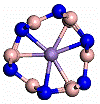Department of Physics and Astronomy: Publications and Other Research

Stephen Ducharme Publications
Document Type
Article
Date of this Version
2016
Citation
Journal of Materials Chemistry C (2016)
Cite this: DOI: 10.1039/c6tc01848c
Abstract
With the increasing interest in deploying ferroelectric polymer in flexible electronics and electromechanics, high-throughput and low-cost fabrication of 3D ferroelectric polymer nanostructures on flexible substrates can be a significant basis for future research and applications. Here, we report that large arrays of ferroelectric polymer nanopillars can be prepared directly on soft, flexible substrates by using low-cost polydimethylsiloxane (PDMS) soft-mold reverse nanoimprint lithography at 135 °C and at pressures as low as 3 bar. The nanopillar arrays were highly uniform over large areas of at least 200 × 200 μm and had good crystallinity with nearly optimum (110) orientation. Furthermore, the method leaves little or no residual polymer layer, fully isolating the nanopillars to avoid cross-talk and, obviating the need for additional etching processes that arises with conventional low-contrast nanoimprinting. The ferroelectric properties of individual nanopillars were probed by piezoresponse force microscopy, which showed that they exhibited switchable and bi-stable polarization. In addition, the polarization hysteresis loops probed by pyroelectric measurements of the entire array showed that the nanopillar capacitor arrays had good ferroelectric switching characteristics, over areas of at least 1 mm × 1 mm.


Comments
©The Royal Society of Chemistry 2016. Used by permission.